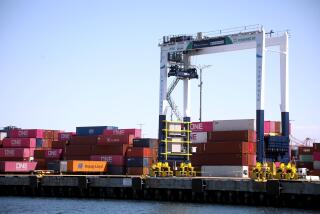Governor Takes Blame for Loss of Collider Project
- Share via
SACRAMENTO — Gov. George Deukmejian declared Thursday that he accepts full blame for California’s loss of a $4.4-billion federal atom smasher project, saying, “If it makes some people happy to blame the governor, I’ll take the responsibility.”
But Deukmejian insisted that the loss of that project and others in recent months does not mean that California is losing its high technology advantage to competing states.
“Month after month and year after year, California continues to be the leader, and we will continue to be the leader in the future,” Deukmejian pledged.
The governor, speaking to reporters at a Sacramento Press Club luncheon, also made a strong pitch for his plan to finance a $2.3-billion highway construction program by borrowing money through voter-approved bonds, calling it a better alternative than raising gasoline taxes.
Responding to criticism that issuing bonds to pay for highways means that all Californians will pick up the tab rather than only the motorists who use the roads, Deukmejian said: “Why pay for roads through gas taxes? It’s uncreative, backward looking and totally ignores the history and tradition in this state.”
On a lighter note, the governor joked that he would not consider accepting a spot on the national Republican ticket because scrutiny by the press might reveal his “wild life style.” Deukmejian, known for his strait-laced morality and cautious politics, said: “I’m a little worried about that. So it’s an unequivocal no.”
The governor’s remarks about the state’s high tech future followed in the wake of Tuesday’s announcement by Energy Secretary John S. Herrington that California is not among seven finalists competing for the superconducting super collider--a pioneering tool of high-energy physics touted as the nation’s largest civilian scientific endeavor.
The project, which promises the winning state $270 million a year in operating funds and 2,500 permanent jobs, was a major initiative by Deukmejian and state lawmakers, whose bid package was rejected partly because of geologic problems surrounding the state’s proposed Central Valley site.
Deukmejian has said that he is considering legal action against the federal government, including a lawsuit to recover the $2.5-million cost of assembling the bid package.
On Thursday, Deukmejian called the federal selection process “eminently unfair,” citing reports that Department of Energy officials had failed to even review portions of California’s proposal.
Noting that he had personally lobbied Herrington as well as President Reagan, Deukmejian said: “We did everything we could have done and presented an outstanding proposal. . . . I am willing to accept the responsibility. Whether I accept it or not, they all blame the governor anyway.”
Earlier this month, a computer chip consortium called Sematech, which is headquartered in California, rejected pleas from the governor and selected Austin, Tex., as the site for its principal manufacturing and development center. Previously, California had lost out to New York for a proposed federal project to study earthquakes.
Deukmejian, however, bristled at reporters’ suggestions that these losses show that California is no longer the magnet it once was to high technology and other emerging businesses.
Citing a recent decision by Ford Aerospace to expand its operations in Santa Clara County--a project that reportedly promises 1,000 jobs more than the Sematech proposal--the governor said: “I’m not concerned about losing the edge in this field. While I certainly wanted these projects in California . . . little attention has been given to what goes on day to day, month after month.”
On the issue of financing major highway improvements through bonded debt, the governor likened his plan to individuals borrowing to buy a home and motorists making monthly payments on their cars. But in the case of highways, he said, even people who don’t drive should be required to pay a share of the costs.
“Just because a person does not own a vehicle,” Deukmejian added, “It doesn’t mean he doesn’t get the benefits of having an outstanding transportation network in this state.”
More to Read
Get the L.A. Times Politics newsletter
Deeply reported insights into legislation, politics and policy from Sacramento, Washington and beyond. In your inbox twice per week.
You may occasionally receive promotional content from the Los Angeles Times.










